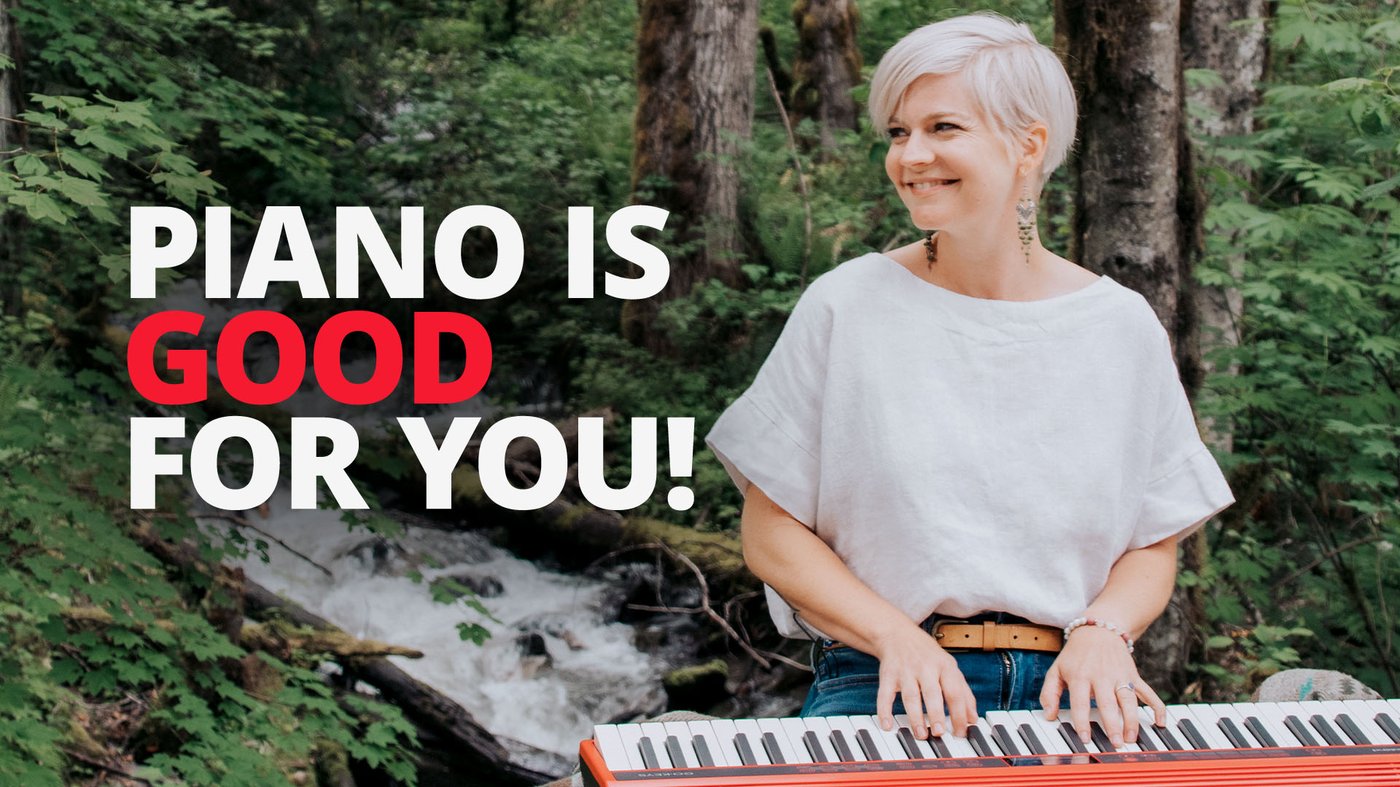
The benefits of playing piano are numerous. From a healthier brain and better mental health to a more rewarding relationship with art, there are few reasons not to start playing piano today!
Here are some of my favorite benefits of playing piano…along with a few personal anecdotes on why I think playing piano is awesome.
Subscribe to The Note for exclusive interviews, fascinating articles, and inspiring lessons delivered straight to your inbox. Unsubscribe at any time.

In one study, college students were sorted into groups where they either played piano, made sculpture, wrote calligraphy, or sat in silence. Remarkably, the piano-playing group experienced far larger drops in cortisol levels than the sculpture and calligraphy groups. So there is definitely something different—and powerful—about playing a musical instrument.
Source: International Journal of Music Education
Whether you’re perfecting an intricate run or letting your imagination go during a jazz solo, playing piano requires a kind of focus that may bring pleasure. This is called the flow state and it happens when you’re doing something you love that challenges you but not to the point of being frustrating. Time flies, and it is a truly fabulous state of mind!
In a study, one group of older adults received piano lessons and daily practice while another group received lessons on music history and appreciation. After six months, the fornix (a white matter tract in the brain) of the music education group declined significantly. Meanwhile, the piano lesson group did not experience the same effect.
The fornix is associated with memory and naturally declines with age. Learning how to play an instrument, therefore, can be a powerful defense against cognitive decline and, perhaps, dementia.
Source: Frontiers in Aging Neuroscience
Today, it feels like our lives are ruled by mobile devices. You’ve probably heard by now how bad doomscrolling can be for our mental and physical health. One way to stop it? Replace it with an activity that doesn’t require screens, such as learning how to play piano! Your fingers will still be active on a keyboard…but a different kind.
Music therapy was first recognized by the United States War Department in 1945. When combined with conventional treatments, music therapy has been shown to effectively treat symptoms of depression and obsessive-compulsive disorder. Music therapy can also benefit people who suffer from insomnia and chronic and acute pain. And no, you don’t have to be a skilled musician to benefit from music therapy!
Learn more: VeryWellMind
Mindfulness meditation can decrease unhealthy rumination, reduce stress, support working memory, and enhance focus, among other things.
To be mindful is to be fully aware, non-judgemental, and present. Active tasks (like mindful eating) can help with this. So, perhaps playing piano can have a similar effect to traditional meditation. After all, playing the piano is an immersive experience that requires full concentration. So, try it as a mindfulness exercise!
Learn more: American Psychological Association
Learning piano can be challenging, but when you achieve a new milestone, no matter how large or small, the sense of accomplishment can greatly improve your self-esteem! Once in a while, look back at everything you’ve achieved and say to yourself, “Wow, I’ve accomplished so much. Surely I can do anything!”
As a young person, my piano teacher entered me into contests and recitals. While nerve-wracking at times, I can credit these experiences to my confidence in public speaking as an adult. Learning to perform definitely helped me with my self-esteem.
There are strong correlations between music and math and reading ability. “[T]here might be, and probably are, general learning processes that underlie all academic achievement,” says Martin J. Bergee, who led a 2020 study that confirmed these links. “Music achievement, math achievement, reading achievement—there are probably more generalized processes of the mind that are brought to bear on any of those areas.”
Source: Science Daily
While playing piano probably isn’t an effective way to lose weight, it’s definitely better than sitting in front of the T.V. In fact, playing piano can work your heart as much as a brisk walk. It also works your forearm muscles.
Source: Ball State University
One study found that the more experience a pianist has with improvisation, the less activity they have in the corresponding area of their brains. Improvisers had less activity in the frontoparietal association areas and more connectivity in the prefrontal, premotor, and motor areas of the frontal lobe. This suggests that the brain increases efficiency in generating creative ideas when this skill is practiced. Perhaps, with practice, creative activities can be “automated” too.
Source: Journal of Neuroscience
At this point, you might wonder which is better for your brain: classical piano or jazz piano? Well, they’ll both change your brain—just in different ways.
Classical pianists focus on accuracy and technique (the “how”) while jazz pianists focus on the “what,” constantly adapting and improvising to harmonic changes. In one study, jazz pianists adapted faster to unexpected chord changes, while classical pianists adapted faster to unusual fingering.
Source: Max Planck Institute
While the piano is often seen as a solo instrument, it can open up your social life! Consider joining an ensemble, playing voluntarily for a senior center or church, or even starting an online or in-person pianist club in your area. Music is always a great conversation starter, especially when you play the same instrument!
If you’re interested in learning how to play piano, you’re likely someone who already appreciates music. But learning an instrument like piano can allow you to appreciate music even more. Piano is a very holistic instrument that integrates theory and practice very well. Learning piano lets you hear details in your music you may have not noticed before and appreciate the ingenuity of your favorite artists.
The piano is a versatile instrument that can handle any genre you throw at it, from classical to jazz and blues to pop. To get the most out of your piano, play as many genres as you can! You may be surprised by how much you like a genre you’ve never heard before.
I grew up on classical music, but discovering jazz pianists like Oscar Peterson, Art Tatum, and Bill Evans was a big epiphany. Learning to appreciate jazz has been inspiring and humbling. If you want to dig into other genres, check out these articles:
If you want the brain benefits of learning piano but have little experience with the keys, try these free lessons:
And if you fall in love with the piano (we believe you will!), consider joining Pianote as a Member:
Charmaine Li is a Vancouver writer who has played piano for over 20 years. She holds an Associate diploma (ARCT) from the Royal Conservatory of Music and loves writing about the ways in which music—and music learning—affects the human experience. Charmaine manages The Note. Learn more about Charmaine here.
/marketing/pianote/promos/april/banner-bg-m.webp)
We use cookies for traffic data and advertising. Cookie Policy »
/marketing/pianote/promos/april/banner-title.webp)